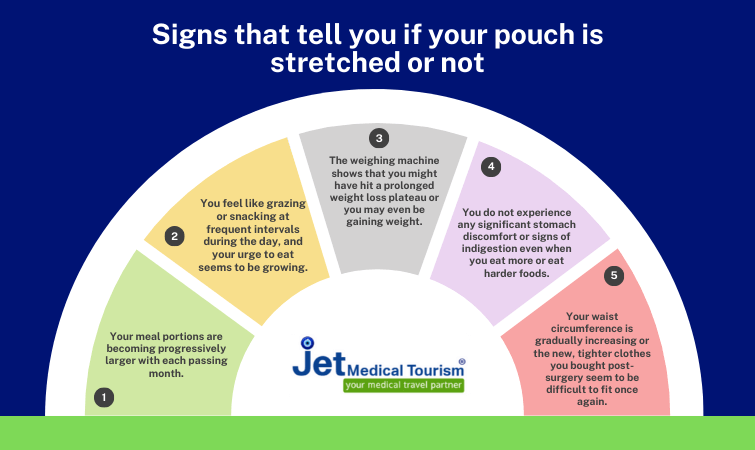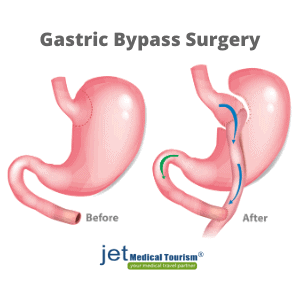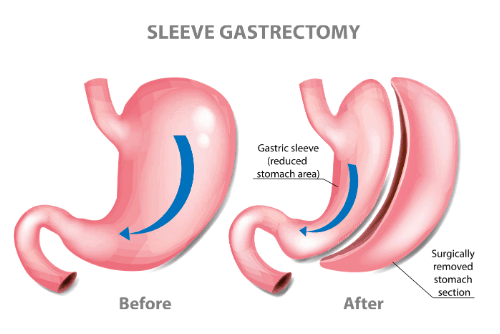How To Tell If Your Pouch Is Stretched?
The stomach is an amazing organ. It has an extraordinary capacity and resilience to store and digest all kinds of food materials. But like any other organ in the body, it has its limits. If you continue to eat larger amounts of food than you need, and eat more of fatty, processed, sugary and hard to digest foods, the stomach pouch will stretch.
When it stretches beyond a limit, you may find it hard to control obesity through diet and exercise. This is where bariatric surgery comes in. But if you do not follow a prescribed diet, the pouch may again start stretching after the surgery. “How to tell if your pouch is stretched” becomes vital so that you can take remedial action as soon as possible.
Jet Medical Tourism is a renowned provider of bariatric surgery, offering procedures like gastric sleeve and gastric bypass in Mexico. In this post, we’ll delve into the crucial topic of identifying signs that indicate whether your stomach pouch has stretched over time. This information can be invaluable for individuals who have undergone bariatric surgery, as it helps them monitor their progress and make informed decisions about their health and well-being.
Contact Jet Medical Tourism® today to start your weight loss journey!
What is a pouch test?
Pouch stretching after gastric bypass or gastric sleeve surgery can be identified with the help of a simple method known as a pouch test. One of the tried and tested methods is called the “cottage cheese test.” If you are wondering about how to tell if your pouch is stretched, you may carry out this pouch test under the advice and supervision of your weight loss surgeon.
The cottage cheese test
Researchers developed the cottage cheese test to determine the actual functional pouch volume following a gastric sleeve or gastric bypass pouch reduction surgery. In the original experiment, the researchers asked patients to eat cottage cheese in a pre-planned manner. Their pouch volume was measured at intervals ranging from 3 to 24 months.
Conclusions of the study
Researchers found that the functional pouch volume increased progressively at each interval. Based on the study, the researchers concluded that the pouch stretches by a physiological process called hyperplasia. This study provided valuable insights to doctors into the correlation between pouch stretching after gastric sleeve or gastric bypass and weight loss.
Why to test your pouch?
Many bariatric surgery patients ask questions such as: “Can you stretch your pouch after gastric bypass?” or “How do you know if you stretched your gastric sleeve pouch?” The answer to these questions lies in measuring the post-surgery pouch volume with the help of a pouch test.
Here are some of the benefits of performing this test:
- The test will give you a fair indication of whether your gastric sleeve or gastric bypass pouch tightening is working well post-operatively.
- The pouch test will provide a reality check in case you have been lax with your bariatric post-op diet and other behavioral guidelines.
- Your surgeon or nutritionist can obtain useful insights into your weight loss progress with a simple home-based pouch test.
- If the test indicates things are not going as planned with your post-op diet and lifestyle, you can do a timely course correction.If the test shows pouch stretching after gastric bypass or gastric sleeve is significant, you may reverse the condition with a bariatric revision surgery
Does the pouch reset test really work?
How to tell if your pouch is stretched may not always be possible with a simple at-home test. However, the research study cited above as well as anecdotal evidence in the form of patient feedback shows that a pouch test may work in many cases. Keep in mind the following facts:
Pouch reset vs. test:
A pouch reset is different from a pouch test. Does the pouch reset really work or not is a controversial question, and sufficient research is not available to conclusively support the efficacy of a reset. But a pouch test is simply a measure to tell whether the pouch has stretched or not. This test is backed by some research.
Consult your surgeon:
Whether you plan to perform a pouch test or a bariatric reset, it is best to talk to your surgeon before you go ahead with it. Remember that after your weight loss surgery, a large part of your stomach has been removed. It is vital to seek medical advice when you plan to undertake a pouch test or a reset.
Perform it correctly:
The success of your gastric bypass or gastric sleeve reset or a pouch test will clearly depend on how accurately you perform the action. Your surgeon will be able to recommend the most appropriate method or technique. Following the bariatric pouch test or reset, the results should also be reviewed only by your surgeon.
Signs that tell you if your pouch is stretched or not
If you are wondering about how to tell if your pouch is stretched, there is good news for you. Even without carrying out a pouch test, you can ascertain an idea of whether your gastric sleeve or gastric bypass pouch tightening is working or not. Your body will speak to you, and you just need to pay attention.

Here are 5 common signs to know if your pouch is stretched:
- Sign 1: Your meal portions are becoming progressively larger with each passing month (compared to your prescribed calorie count).
- Sign 2: You feel like grazing or snacking at frequent intervals during the day, and your urge to eat seems to be growing.
- Sign 3: You do not experience any significant stomach discomfort or signs of indigestion even when you eat more or eat harder foods.
- Sign 4: The weighing machine shows that you might have hit a prolonged weight loss plateau or you may even be gaining weight.
- Sign 5: Your waist circumference is gradually increasing or the new, tighter clothes you bought post-surgery seem to be difficult to fit once again.
Related: Why am I not losing weight after gastric sleeve surgery?
Steps to test your pouch
The surest way to tell if your pouch is stretched is by performing a simple home test. You should speak to your bariatric surgeon or dietitian prior to performing this test. Once you complete the test, you should share the results with them to obtain professional advice on how to course-correct your weight loss journey.
Here is a step-by-step approach to perform a pouch test:
- Step 1: Decide a time to perform the test (preferably set if for the day’s first meal), and fast for one hour prior to the scheduled time.
- Step 2: Choose between mashed potatoes and cottage cheese, and keep a measured quantity of 8 oz. on your plate.
- Step 3: Eat until you satiate your hunger, and stop when you feel that eating any further food may lead to stomach discomfort.
- Step 4: Now see how much of the food is still remaining (leftover) in your plate, and measure this quantity by weight.
- Step 5: Deduct this remainder quantity from the original quantity of 8 oz. The figure that you get is roughly equivalent to your current functional pouch volume.
Can you stretch your pouch after gastric bypass?
 Pouch stretching after gastric bypass to some degree is normal. In general, the functional stomach pouch volume may be about 5 to 5.5 oz at 12 months after your bariatric surgery. At 24 months, the pouch size would have grown to about 6 or 6.5 oz on average.
Pouch stretching after gastric bypass to some degree is normal. In general, the functional stomach pouch volume may be about 5 to 5.5 oz at 12 months after your bariatric surgery. At 24 months, the pouch size would have grown to about 6 or 6.5 oz on average.
This much of pouch stretching after your gastric bypass surgery is natural, and is not a cause for concern.
Pouch stretches when you violate prescribed diet
When you occasionally eat one large or unhealthy meal, it does not mean that your pouch will stretch. However, if you continue to eat excess food, or make wrong food choices, even a minor violation over an extended period of time will cause your pouch to stretch after bariatric surgery. Other lifestyle factors, such as drinking alcohol or lack of exercises, may also contribute to this condition.
Other reasons for pouch stretching after gastric bypass
Can you stretch your pouch after gastric bypass even if you have not exceeded your prescribed diet? The answer is ‘yes’ in exceptional cases. Hereditary factors, hormonal imbalances, and co-morbidities may cause the stomach pouch to stretch considerably in a few patients. If your gastric bypass surgery was not correctly performed, the pouch volume may not reduce as much as required.
Tips for gastric bypass pouch tightening
Once you know how to tell if your pouch is stretched, you will be more alert to any signs of pouch stretching after gastric bypass. One of the popular ways to achieve gastric bypass pouch tightening after it has stretched is to have a bariatric reset. You may consider a 5-day or 10-day gastric bypass pouch reset program in consultation with your surgeon or nutritionist. Here are a few additional tips for sustainable pouch tightening:
- Restrict your calorie intake to 1,200 calories a day for the long-term.
- Measure your food each time before you eat, and restrict to 6 oz. maximum.
- Minimize fatty, processed, sugary, and empty calorie foods in your diet.
- Make sure to include about 65 g of lean proteins in your daily diet.
- Eat to satiate your hunger, but stop if you feel nauseous.
- Do not drink water or other beverages before and after 30 minutes or during the meals.
- Avoid a sedentary lifestyle and do regular exercises to keep your pouch healthy, fat-free, and resilient.
How do you know if you stretched your gastric sleeve?
 Pouch stretching after gastric sleeve may occur if you fail to adhere to the dietary guidelines of your bariatric surgeon. This condition often occurs in the first one to two years following a sleeve gastrectomy, but clinically your sleeve may re-stretch at any stage. It is vital to maintain a balanced diet and a regular fitness regimen to ensure sustainable weight loss. Here are a few signs to know if you stretched your gastric sleeve:
Pouch stretching after gastric sleeve may occur if you fail to adhere to the dietary guidelines of your bariatric surgeon. This condition often occurs in the first one to two years following a sleeve gastrectomy, but clinically your sleeve may re-stretch at any stage. It is vital to maintain a balanced diet and a regular fitness regimen to ensure sustainable weight loss. Here are a few signs to know if you stretched your gastric sleeve:
- You tend to feel hungry more frequently during the day.
- You find yourself eating larger meal portions than what is prescribed.
- You increasingly add calorie-dense foods instead of proteins in your diet.
- You do not feel stomach discomfort or nausea even if you eat more.
- You are chewing less and eating faster to satisfy your hunger.
- You are eating to cope with boredom or emotional ups and downs.
- Your weight is no longer reducing at the expected rate or you are adding more pounds.
Tips for gastric sleeve reset
The most effective way to achieve permanent freedom from obesity following your gastric sleeve surgery is to be mindful of what you eat and how much you eat. However, if you find that your pouch is stretched post-operatively, you may go for a gastric sleeve reset.
This is a simple 5-day at-home diet plan to achieve a pouch reset after gastric sleeve surgery.
- Day 1: Restrict yourself to 100% clear liquids only throughout the day. Drink plenty of water, and choose other liquids, such as popsicles (sugarless) and clear broth.
- Day 2: Stay on a diet of water and thick liquids throughout the day. Keep hydrated and choose items, such as thin applesauce, thin oatmeal, and fat-free yogurt.
- Day 3: Eat only pureed foods. You may include foods, such as cottage cheese (low fat), scrambled eggs, and hummus. The diet of the previous two days can be added as well.
- Day 4: On the fourth day, you can eat soft, adaptive foods, such as mashed fruits and veggies, thick soups and soft cereals. Pureed foods can be included as well.
- Day 5: This is the final day of your gastric sleeve reset diet. Eat solid foods, which are healthy and nutritious. But count your calories, eat slowly, and chew your food thoroughly.
Related: Gastric sleeve diet
Final words on bariatric pouch stretching and reset
Remember from day one that bariatric surgery is an assistive tool to help you lose weight, but it is not a magic wand. Your focus and determination to get rid of obesity permanently will play a key role. Be conscious of the signs and tips we have discussed in this guide on how to tell if your pouch is stretched. Do not hesitate to talk to your weight loss surgeon or your nutritionist if you find that your pouch is stretched.
Bariatric reset is one of the recognized ways to put you back on track for your post-surgery weight loss. But does the pouch reset really work – research is still lacking in this area. With support from your bariatric surgeon and nutritionist, you can win your battle against obesity and achieve your weight loss goals. Make sure you have the best professionals to help you in this journey.
Ready to say goodbye to the challenges of obesity?
Tired of struggling with obesity? Jet Medical Tourism offers affordable, world-class weight loss surgery to help you transform your life.
Our experienced bariatric surgeons provide expert care through every step of this life-changing process. Contact us now to start your weight loss journey!


